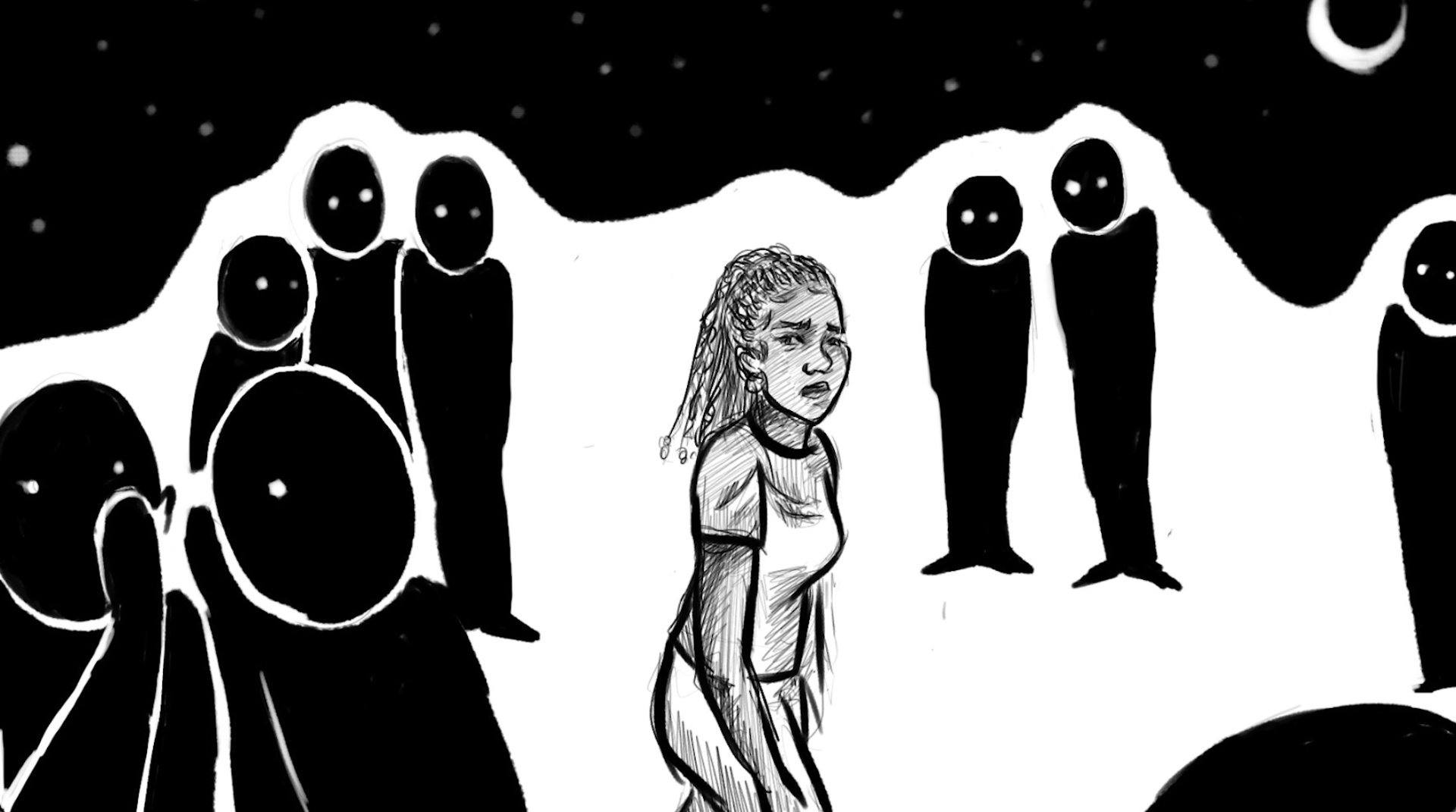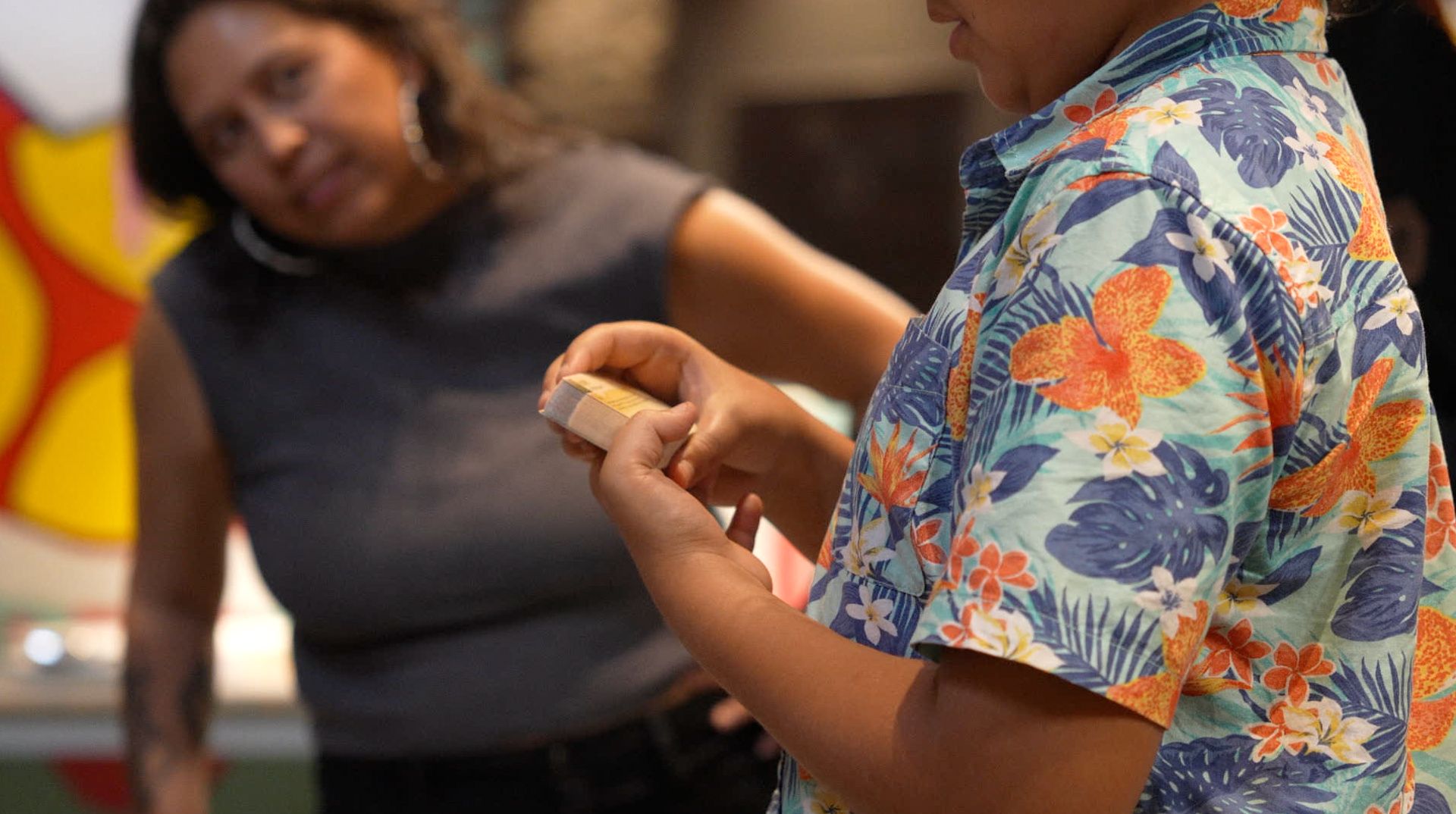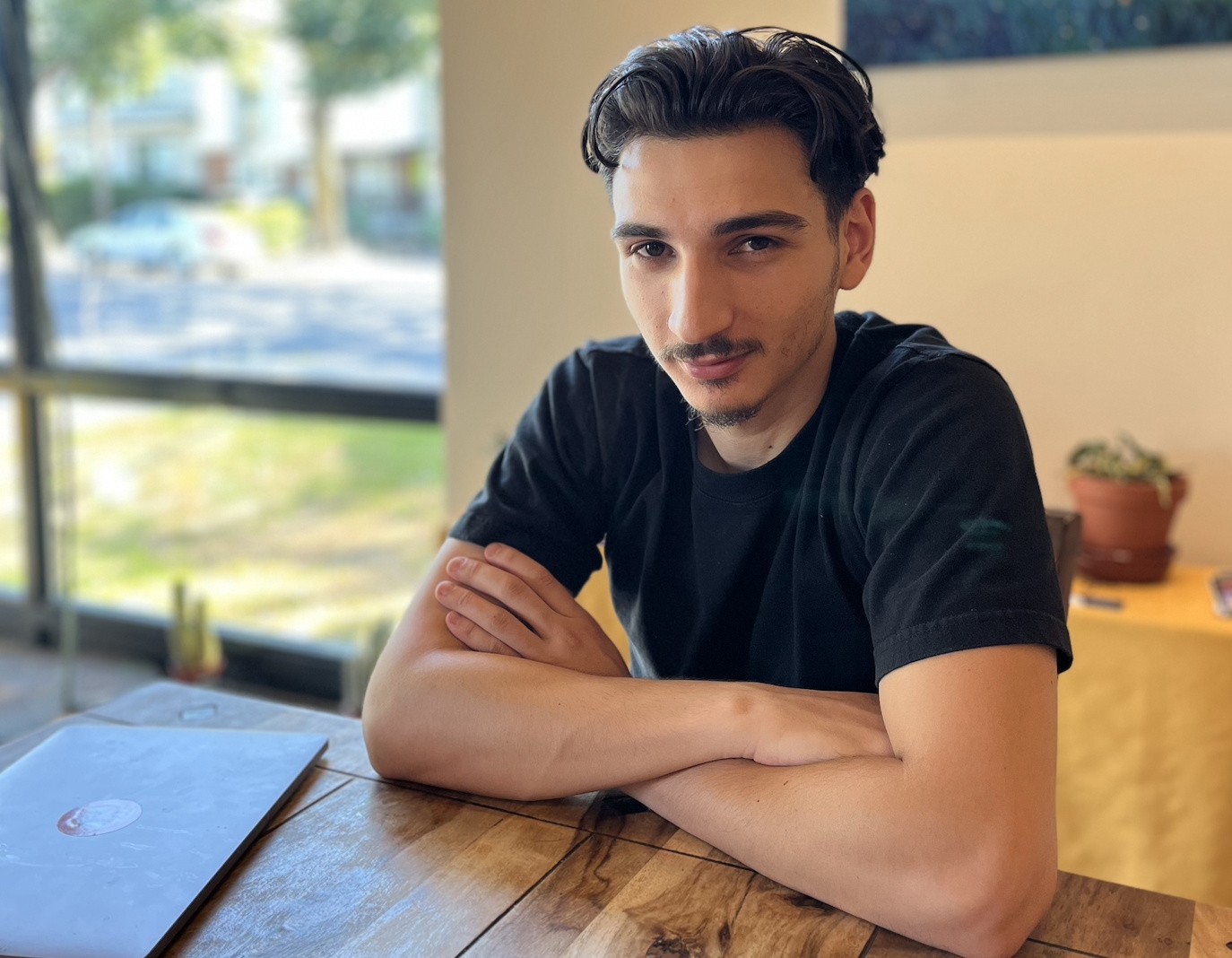From November 2023 to March 2024, five young Montrealers from various neighborhoods joined the École Converse Podcast 2024 in collaboration with La puce à l'oreille. Kester, Nesim, Sadjida, Sami and Adrianna, aged 16 to 19, represent both geographic and ethnic diversity. Despite their differences in background and origin, they share one thing: the desire to make known the reality of young people in the neighborhoods, which is often trivialized.
“We're not important, because we live in the middle of Montreal, because we come from a bad neighborhood, because we're Black, because we're Arabs,” says Kester. “Just because you're Arab doesn't mean you're going to end up a bandit! ” exclaims Sami.
Originally from various neighborhoods in Montreal, including Rivière-des-Prairies, including Rivière-des-Prairies, Laval, Laval, Saint-Michel and Saint-Léonard, young people discover over the weeks that they have similar concerns, including social ill. Their shared experiences go beyond the borders of their respective neighborhoods.
The fruit of their collaboration, entitled “Not all of Montreal”, exposes the reality of young people in the neighborhoods, between stigma and the desire to make their voices heard.
These young people embody resilience and hope. Beyond the struggles of their daily lives, they share their aspirations for a better future. By claiming their place in society, they are the voices of a generation determined to make its voice heard.
What is social pain?
When asked about the nature of social evil, Converse School students share their common experience concisely: “Social pain is the sick society whose symptoms we suffer from. It's not just a social problem, it's a persistent problem. It's an injustice, a rejection, a situation that persists on a daily basis,” summarizes Kester.
To illustrate this idea, Sami offers a concrete example: “One of my Algerian friends, when he arrived in Canada at the age of five, he had difficulty speaking and making friends. That's a social problem. But years later, in high school, he kept getting rejected. He started to feel alone because he was being discriminated against; and that's a social pain.”
Sadjida shares a similar perspective, stressing that social evil often stems from valuing one community over another. In her neighborhood, she observes a rejection of racialized populations, even if they are in the majority. In this regard, she cites some examples such as the conversion of a soccer field into a baseball field, a sport that is less popular with the inhabitants of the neighborhood. Sami adds, reporting a general indifference to North Africans in his own neighborhood.
“At first, we didn't think we were sharing the same social pains, but we came to realize that our experiences were similar,” says Sami.
Brought together by their daily struggles against social rejection, stigma, racism and police violence, these young people each experience a social pain. Perhaps you will recognize yourself in the testimony of one of them.
“Not all of Montreal is safe”
Kester, who is 18, lives in Rivière-des-Prairies. A fan of podcasts for a few years, he immediately caught the ball when a local speaker told him about Converse School. The young man sees this as a stepping stone. It is an opportunity for him to learn to put into words what he experiences on a daily basis, he tells us.
Taking the floor to introduce himself, he describes himself as a young person who does not particularly shine at school, who is often bored in class, but who is full of creativity. Kester introduces herself with spontaneity and a touch of humor throughout the podcast, captivating the audience with her engaging personality and quick wit.
By speaking, the young man wanted to highlight the obvious differences that may exist between Montreal's popular neighborhoods and Montreal North's. “In Montreal's West End, people know what's going on in Montreal North, but they don't really know what's going on.” According to him, “not all of Montreal is safe.”
Witnessing several incidents where weapons have been used, Kester often comes home from school scared. “It's affecting my mental health,” he admits.
“I want people to know, I want them to be aware of our realities. There is a side of Montreal that is not in the media,” he says. “They don't know what it's like to feel abandoned,” adds Kester. “In Rivière-des-Prairies... it's empty, empty, empty, empty, empty,” he says, underlining the isolation he feels in his neighborhood.
Throughout the podcast, Kester shares her observations and stories, offering a unique look at the reality of her neighborhood and challenging the stereotypes often associated with Montreal Nord.
“Not all of Montreal has to surpass itself”
Nesim, aged 16, lives in Saint-Michel. The young man shows calm confidence. Her voice is calm, almost academic, reflecting early maturity. Originally from Saint-Michel, Nesim is involved in his neighborhood at the Youth Forum. In fact, it was through an organization coordinator that he heard about Converse School.
His commitment began at the age of 14 with the organization Jeunesse Involve, which he founded himself.
Nesim has not always shown the determination that drives him today. During the first episode of “Not All of Montreal,” he humbly admits that when he was younger, he was not a particularly studious student. However, an experience that he describes as racist with a professor left a profound impression on him, and was even a real turning point in his life. This traumatic experience was a catalyst for him and prompted him to redouble his efforts to break stereotypes, not only for himself, but also for his community.
Nesim is aware of the social barriers he faces as a young person of North African origin. “In Montreal, Arabs are often associated with violence and disruption,” he says. “Not all young Montrealers have to go above and beyond to break stereotypes,” he said a few moments later. However, Nesim refuses to be reduced to its origin. His approach is clear: “I am a young Arab, but I am also just a young person, or even an involved and committed young person.”
He has high aspirations for the future. He wants to pursue law studies and then move on to the health field. Its objective is to “constantly improve and progress”, both academically and socially.
“Not all of Montreal has to make an effort to be accepted”
Sadjida, who is 16, lives in Saint-Léonard. When asked what “Not all of Montreal” means to her, she answers this: “Not all of Montreal needs to make an effort to be accepted.”
Sadjida is a young girl of North African origin and she wears the veil. She says she feels a mixed feeling between rejection and pride in being different. “The fact that people talk to me differently, to be treated differently because of my origins or because of my veil, it can hurt me,” she says. When I walk down the street, my veil attracts attention and what I see in the eyes of others is discomfort.”
Soft by nature, Sadjida gives the impression of being shy at first glance, but all you have to do is scratch a little to discover the strength and depth of her thoughts. Despite her young age, she attracts the attention and commands the admiration of both her generation and the older ones. She describes herself as a flower, evoking her delicacy, but at the same time, she aspires to become a strong woman who can overcome obstacles and stand up for her beliefs courageously.
The young woman is aware that her identity, personality and even her innermost aspirations are often called into question by the preconceived judgments of others. “People don't have enough confidence in my aspirations, perhaps because they think that Arabs are condemned to a certain type of work,” she says.
At the age of 16, Sadjidja is already realizing some of her professional dreams. She, who wishes to devote her life to writing, is currently writing a novel about a young person facing inevitable trials. The author wants to give hope to young people. “Even if you are in a pretty difficult situation, you can get out of it if you ask yourself the right questions,” she says.
The young woman has more than one trick up her sleeve. Since the age of 14, she has been developing, in parallel with her studies, a made-to-order pastry company. But her real interest is journalism, she tells us. For her, this podcast is an opportunity to explore the profession.
“Not all of Montreal is considered”
Sami, aged 16, lives in Laval. In École Converse, he found an opportunity to engage with racialized youth and to look at the experiences of racism and social abandonment experienced by some young people.
Of Algerian origin, Sami has experienced racism. However, he says he is privileged. “Of course I have experienced racism, but not as much as others, because I was born here,” he says. In particular, the young man refers to the experience of his foreign-born friends. “My immigrant friends have experienced racism as soon as they arrived and are constantly victims of rejection. Nobody wants to stay with them.”
A resident of the Duvernay neighborhood in Laval, Sami often witnesses the social isolation that some young people face. “A little further away from home, I see people hanging out together, young people who have been socially rejected, and that has dangerous consequences,” he says. He is aware that the treatment of young people is not equal. “Not all of Montreal is considered,” he says.
Committed to his community, Sami aspires to one day become a source of help for future generations. “If I am successful and in a high position, I am not going to change my mind. I know where I come from. I will be able to help others, because I will have experienced what they are going through,” he tells us.
For the years to come, Sami is considering an artistic career, especially rap.
“Not all of Montreal experiences the same realities”
Adrianna, who is 19, lives in Rivière-des-Prairies. She is the oldest member of the group. It was La Converse's reputation that made him want to join Converse School. “I have a connection in my values with La Converse. There is a real message that is being communicated,” she says, snapping her fingers.
The young woman is good with her hands. A self-employed marketing consultant, Adrianna helps local companies and businesses owned by racialized people develop their social networks. Besides that, she is also a part-time beautician.
This entrepreneurial journey is not a path she expected to take so quickly. A studious young woman, Adrianna was deeply upset in 2022 when an alert forced the evacuation of Cégep Maisonneuve due to the potential presence of a firearm on the premises of the educational institution.
Immersed in this situation, Adrianne found herself confronted with the weapons of the police. This traumatic experience, which she says was “tinged with racism,” led her to make a difficult decision: to drop out of school, as the school environment had become a source of anxiety for her. “It's sad, because it was not the academic path I had planned for me,” she says with a mixture of regret and resolve. However, despite the lack of a diploma, she remains hopeful for her future, convinced that her trajectory will not end there.
A resident of Rivière-des-Prairies, Adrianna knows the same realities as Kester, even though she is a woman. “It's part of life, at least part of my life... I am aware that not everyone experiences the same realities,” she notes.
Daughter of a social worker, the young woman reflects on her environment and does not hesitate to express her opinions. In the La Converse studio, she unhesitatingly engages in a candid discussion about the trivialization of violence faced by people of color, while opening her heart to share her own dreams and aspirations.
For the future, Adrianna wants to explore several other areas. “I like to do a lot of things, honestly. But what I am really passionate about is cinema.”
The message of young people
In the final episode of the podcast, students engage and take the time to write a letter to the person they will become in a few years. They have a message for those who oppressed them, those who supported them, and those who share their reality.
Sadjida starts: “I would like to say to this person who looks like me and who listens to me: you are not alone. You just have to be hopeful and work hard.”
Nesim speaks to himself and to the listeners: “If you are at this level, you deserve it. You should be proud of yourself! ”
“Just because an Arab did shit doesn't mean those who follow after will also do shit. That Arab you criticized will become better than you later! ” exclaims Sami.
Kester insists on the transformative effect of youth workers in his life. “Taking the time to come talk to me and encourage me has transformed me. They often tell me: “I am talking to you to sow a seed in the hope that it will blossom.” It is not a seed that they give, but a house! The RDP team has truly transformed my life,” he says, moved.
Adrianna concludes this emotional episode with a word of encouragement: “The trials you are going through are not just about you, there is always a reason behind these challenges. It is important to learn from these obstacles and to always look for the light at the end of the tunnel.”








%20(1).jpg)
.jpg)
.jpg)